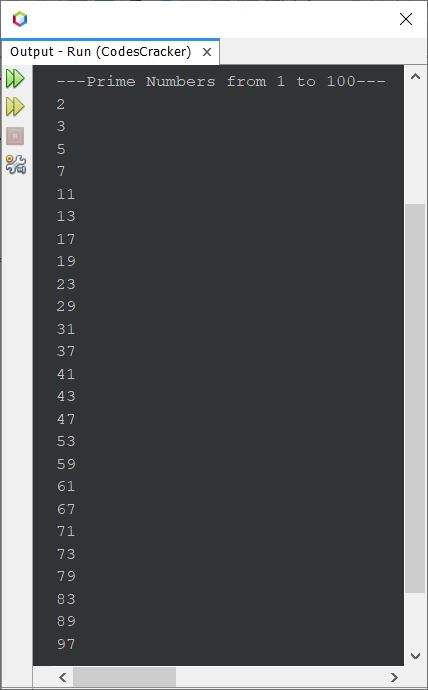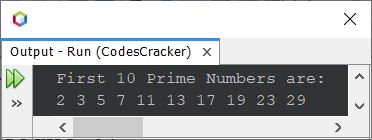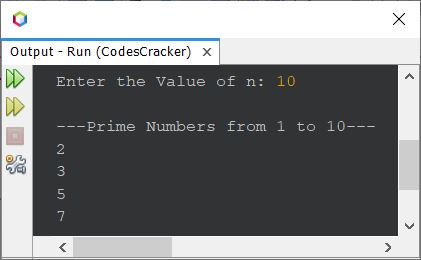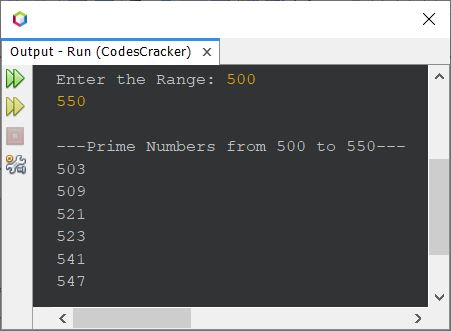- Java Basic Programs
- Java Programming Examples
- Java Print Hello World
- Java Get Input from User
- Java Print Integer
- Java Add two Numbers
- Java Check Even or Odd
- Java Check Prime or Not
- Java Check Alphabet or Not
- Java Check Vowel or Not
- Check Reverse equal Original
- Java Fahrenheit to Celsius
- Java Celsius to Fahrenheit
- Java Perfect Number Program
- Java Find Quotient Remainder
- Java Days to Seconds
- Java Count Digits in Number
- Java Binary Number Addition
- Java Discount Program
- Java Compute Courier Charge
- Java Find Telephone Bill
- Java Print ASCII Values
- Java Check Palindrome or Not
- Java Check Armstrong or Not
- Generate Armstrong Numbers
- Add two Numbers using Pointers
- Java Mathematical Programs
- Add Subtract Multiply & Divide
- Java Make Calculator
- Java Add Digits of Number
- Java Check Leap Year or Not
- Java Check Divisibility
- Java Find Simple Interest
- Java Find Compound Interest
- Java Print Fibonacci Series
- Java Find nCr nPr
- Calculate Average & Percentage
- Java Calculate Arithmetic Mean
- Java Calculate Student Grade
- Java Print Table of Number
- Java Print Prime Numbers
- Java Add n Numbers
- Java Interchange two Numbers
- Java Reverse Numbers
- Java Swap two Numbers
- Count Positive Negative & Zero
- Find Largest of two Numbers
- Find Largest of three Numbers
- Java Find Factorial of Number
- Java Find HCF & LCM
- Area & Perimeter of Square
- Area & Perimeter of Rectangle
- Area & Circumference of Circle
- Java Conversion Programs
- Java Decimal to Binary
- Java Decimal to Octal
- Java Decimal to Hexadecimal
- Java Binary to Decimal
- Java Binary to Octal
- Java Binary to Hexadecimal
- Java Octal to Decimal
- Java Octal to Binary
- Java Octal to Hexadecimal
- Java Hexadecimal to Decimal
- Java Hexadecimal to Binary
- Java Hexadecimal to Octal
- Java Pattern Programs
- Java Pattern of Stars
- Java Pattern of Alphabets
- Java Pattern of Numbers
- Java Pyramid of Stars
- Java Pyramid of Alphabets
- Java Pyramid of Numbers
- Java Print Diamond Pattern
- Java Print Floyd Triangle
- Java Print Pascal Triangle
- Java Array Programs
- One Dimensional Array Program
- Java Linear Search
- Java Binary Search
- Find Largest Element in Array
- Find Smallest Element in Array
- Java Reverse Array
- Insert Element in Array
- Delete Element from Array
- Java Merge two Array
- Java Bubble Sort
- Java Selection Sort
- Java Insertion Sort
- Java Find Common Elements
- Java Count Even/Odd Number
- Two Dimensional Array Program
- Java Add two Matrices
- Java Subtract two Matrices
- Java Transpose Matrix
- Multiply two Matrices
- Three Dimension Array Program
- Java String Programs
- Java Print String
- Find Length of String
- Java Compare two String
- Java Copy String
- Java Concatenate String
- Java Reverse String
- Delete Vowels from String
- Delete Words from Sentence
- Find Occurrence of a Character
- Java Find Occurrence of a Word
- Occurrence of Each Character
- Java Occurrence of Each Word
- Java Count Repeated Characters
- Java Count Repeated Words
- Java Capitalize Each Word
- Java Count Vowels/Consonants
- Java Extract Numbers
- Java Count Word in String
- Remove Spaces from String
- Java Sort a String
- Java Uppercase to Lowercase
- Java Lowercase to Uppercase
- Java Swap two Strings
- Java Check Anagram or Not
- Java Check Balance Parentheses
- Java Check Password Strength
- Java File Programs
- Java Read File
- Java Write to File
- Read & Display File Content
- Java Copy File
- Java Append Text to File
- Java Merge two File
- List files in Directory
- Java Delete File
- Java Miscellaneous Programs
- Generate Random Numbers
- Java Print Time & Date
- Java Get IP Address
- Java Shutdown Computer
- Java Programming Tutorial
- Java Tutorial
Java Program to Print Prime Numbers
This article covers multiple programs in Java to print prime numbers. Here are the list of programs covered in this article:
- Print prime numbers from 1 to 100
- Print first 10 prime numbers
- Print prime numbers from 1 to n
- Print prime numbers in given range
- Print prime numbers using while loop
Note - A number that can only be divisible by 1 and the number itself is called a prime number. For example: 2, 3, 5, 7, 11, 13, 17 etc., are all prime numbers.
Print Prime Numbers from 1 to 100 in Java
The question is, write a Java program to print prime numbers from 1 to 100. The program given below is its answer:
public class CodesCracker { public static void main(String[] args) { int i, j, chk; System.out.println("---Prime Numbers from 1 to 100---"); for(i=2; i<=100; i++) { chk = 0; for(j=2; j<i; j++) { if(i%j==0) { chk++; break; } } if(chk==0) System.out.println(i); } } }
The snapshot given below shows the sample output produced by above program, on printing of all prime numbers from 1 to 100:

Print First 10 Prime Numbers in Java
This program almost uses the same concept as of previous program, to print the first 10 prime numbers. In this program, I've used a variable named count, whose initial value is 0. And its value gets incremented each time by 1, after printing a prime number.
And the loop continue its execution, to print prime numbers, until the value of count becomes equal to 10, or until the condition count<10 evaluates to be False.
public class CodesCracker { public static void main(String[] args) { int i, j, chk, count=0; System.out.println("First 10 Prime Numbers are:"); for(i=2; count<10; i++) { chk = 0; for(j=2; j<i; j++) { if(i%j==0) { chk++; break; } } if(chk==0) { System.out.print(i+ " "); count++; } } } }
The output produced by above program on printing of first 10 prime numbers, is shown in the snapshot given below:

Print Prime Numbers from 1 to n in Java
Now this program prints prime numbers from 1 to n. And of course, the value of n would be received by user at run-time of the program.
import java.util.Scanner; public class CodesCracker { public static void main(String[] args) { Scanner scan = new Scanner(System.in); System.out.print("Enter the Value of n: "); int n = scan.nextInt(); System.out.println("\n---Prime Numbers from 1 to " +n+ "---"); for(int i=2; i<=n; i++) { int chk = 0; for(int j=2; j<i; j++) { if(i%j==0) { chk++; break; } } if(chk==0) System.out.println(i); } } }
Here is its sample run with user input 10 as value of n to print prime numbers from 1 to 10

Print Prime Numbers in Given Range in Java
Now this program allows user to define the range, the start and end value, to print all prime numbers in between the given range.
import java.util.Scanner; public class CodesCracker { public static void main(String[] args) { Scanner scan = new Scanner(System.in); System.out.print("Enter the Range: "); int start = scan.nextInt(); int end = scan.nextInt(); System.out.println("\n---Prime Numbers from " +start+" to " +end+ "---"); for(int i=start; i<=end; i++) { int chk = 0; for(int j=2; j<i; j++) { if(i%j==0) { chk++; break; } } if(chk==0) System.out.println(i); } } }
The sample run with user input 500 and 550 as range, is shown in the snapshot given below:

Print Prime Numbers in Java using while Loop
The previous program can also be written using while loop, instead of for. For this, just replaced the for loop's block of code, with following block of code:
int i=start; while(i<=end) { int chk = 0; int j=2; while(j<i) { if(i%j==0) { chk++; break; } j++; } if(chk==0) System.out.println(i); i++; }
Same Program in Other Languages
« Previous Program Next Program »